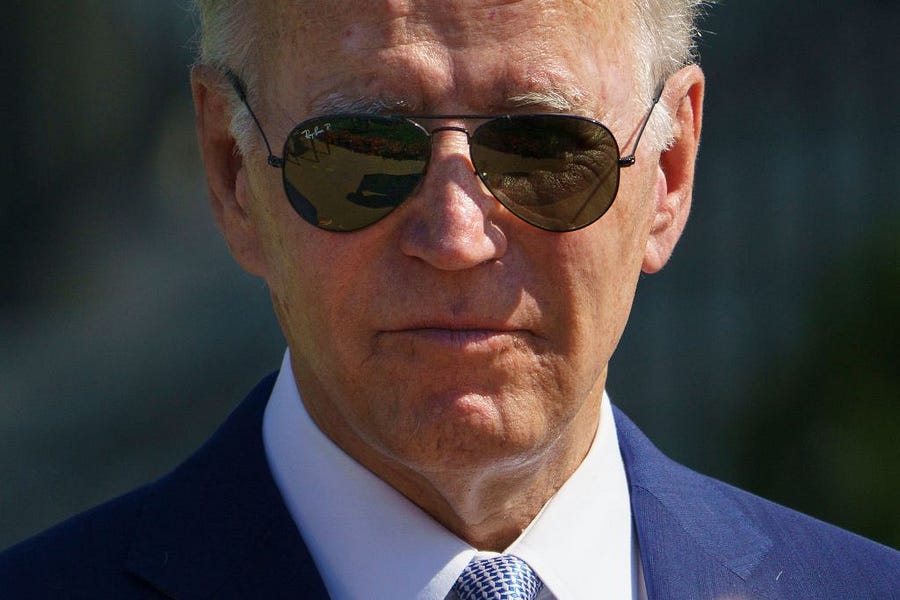You know why it’s a cliche to say “X amount of time is a lifetime in politics”? Just look at how August is shaping up.
Just a few weeks ago, buzz over the coming “red tsunami” in the midterms was common. All of a sudden that sounds more like wishful thinking.
The change has come so suddenly, polls are still lagging behind what hipsters might call a political “vibe shift.” Yet even some long-term trends support the idea the GOP peaked too soon. In January, Republicans led by 7 percentage points on the generic ballot (which asks which party should control Congress), an unprecedented advantage for Republicans. Democrats are now ahead by 7 percentage points, a 14-point swing.
At the end of July, the political conversation was dominated with talk of Biden’s failing presidency, his historic unpopularity, and the question of whether he would even run again. Since then, we’ve seen a series of legislative victories, including the Inflation Reduction Act (thanks to Democrats finally corralling Sens. Joe Manchin III and Kyrsten Sinema), the killing of al-Qaeda leader Ayman Zawahiri, and a hugely strong jobs report that lends credence to the White House’s “it’s not a recession!” messaging.
The most unnerving shock for the GOP came in Kansas last week. In a referendum, 59 percent of Kansas voters, turning out in massive numbers in the dog days of summer, opted not to give the Republican-controlled legislature the ability to restrict abortion rights. Anti-abortion advocates bungled both the wording of the referendum and the arguments for it, but both the enormous turnout and margin in a Republican state has GOP consultants in a state of panic.
Many of the fundamentals are still in the Republicans’ favor and it would still be shocking if they didn’t take back the House. The Senate is another question, and the GOP’s problems on that front are illustrative of the party’s changing fortunes.
It’s one of the most durable rules in American politics: When voters are surly, the party out of power benefits. That’s why almost every election for the last quarter century has been a “change” election. The key to riding the mood of the electorate is for the party out of power to stay focused on the reasons the party in power is unpopular. Given global turmoil, rising crime, high gas prices and the return of inflation, Republican talking points almost write themselves.
But thanks to the Supreme Court’s overturning of Roe vs. Wade and the outsize role of Donald Trump in the primaries, the GOP is constantly being pulled off script. On abortion, Republicans like Florida Gov. Ron DeSantis have found a safe harbor in restricting abortion after 15 weeks and then getting back on message. But the national conversation is dominated by horrific stories of pregnant child rape victims and Republicans defending absolute bans. As the Kansas referendum demonstrated, a lot of Republican politicians were caught unprepared to talk about a post-Roe world and a lot of voters, even Republican ones, want time to take stock before barreling ahead further on abortion.
The tone Republicans need to set on abortion and other issues is one of reassuring normalcy and competence. But the loudest Republicans are going another way.
For instance, outside the MAGA base, no one wants to hear about bogus claims that the 2020 election was stolen anymore. And against the backdrop of the House Jan. 6 committee hearings, such claims no longer sound like sour grapes, but something far more sinister.
In previous cycles, to ensure a Republican majority, Sen. Mitch McConnell reached into GOP primaries to boost candidates with the best chance of winning the general election. This time, McConnell let Trump play that role uncontested. That decision may cost him the majority leader’s gavel. Trump enjoys picking winners, but he mostly just wants enablers.
In Ohio, which Trump carried by 7 percentage points in 2020, the Democrat, Tim Ryan, has a narrow lead over J.D. Vance. In Pennsylvania, Mehmet Oz is behind by 11 percentage points. In Georgia, Herschel Walker is trailing Democrat Raphael Warnock by 3 percentage points in a state where the Republican governor is comfortably in the lead. In Arizona, Blake Masters is behind Democratic Sen. Mark Kelly by 9 percentage points. The best you can say about Masters is he’s not as loony as Kari Lake, the Trump-endorsed election conspiracy theorist who will be at the top of the Republican ticket running for governor.
This could all be just a summer squall before the general election starts after Labor Day. But if the last few weeks have demonstrated anything, it’s that even a couple of weeks can be a lifetime in politics.







Please note that we at The Dispatch hold ourselves, our work, and our commenters to a higher standard than other places on the internet. We welcome comments that foster genuine debate or discussion—including comments critical of us or our work—but responses that include ad hominem attacks on fellow Dispatch members or are intended to stoke fear and anger may be moderated.
With your membership, you only have the ability to comment on The Morning Dispatch articles. Consider upgrading to join the conversation everywhere.